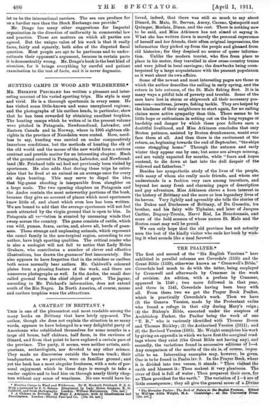A CHATEAU IN BRITTANY. t This is one of the
pleasantest and most readable among the many books on Brittany that have lately appeared. The author, though she does not explain the situation in so many words, appears to have belonged to a very delightful party of Americans who established themselves for some months in a large old house, half chateau, half farm, in the environs of Dinard, and from that point to have explored a certain part of the province. The party, it seems, were neither artists, anti- quarians, archeologists, nor devoted to any other science. They made no discoveries outside the beaten track ; their headquarters, as we perceive, were on familiar ground ; and yet the book has a most singular freshness, with a note of per- sonal enjoyment which in these days is enough to take a reader captive and to lead him on through nearly thirty chap- ters without any sense of weariness. No one would have be-
• Hunting Camps in Wood and Wilderness. By H. Hesketh Prichard. F. Z. B. With a foreword by F. C. Selena. Illustrated by Lady Helen Graham, E. G. Caldwell, and from photographs. London: William Heinemann. rise, net.] t A Chdteau in Brittany. By Mary J. Atkinson, with 16 Illustrations and Frontispiece. London : Stanley Paul and Co. [10s. 6d. net.]
lieved, indeed, that there was still so much to say about Dinard, St. Malo, St. Set-van, Auray, Carnac, Quimperle and Quimper, Morlaix, Dinan, and the rest. There is nothing new to be said, and Miss Atkinson has not aimed at saying it. What she has written down is merely the personal experience of herself and her friends, their often original impressions, the information they picked up from the people and gleaned from old histories ; for they despised no source of queer informa- tion. Unlike the modern tourist, who flies from place to place in his motor, they travelled in slow cross-country trains and were jolted in local carriages; the drawbacks being coun- terpoised by a large acquaintance with the peasant population as it went about its own affairs.
Some of the newest and most interesting pages are those in which the author describes the sailing in early spring, and the return in late autumn, of the St. Melo fishing fleet. It is in many ways a pitiful tale of poverty and trouble. Some of the men have lost in storm or shipwreck all their necessary pos- sessions—mattress, jerseys, fishing tackle. They are helped by the kindness of their neighbours to start again, for no calling claims more active sympathy than this. There seems to be little hope or enthusiasm in setting out on the long voyages of hardship and danger by which these poor fellows earn a doubtful livelihood, and Miss Atkinson concludes that only Breton patience, assisted by Breton drunkenness, would ever face them at all. And then there is the excitement of the return, as, beginning towards the end of September, "the ships come straggling home." Through the autumn and early winter they appear one by one; but some are always missing, and are vainly expected for months, while " fears and hopes contend, to die down at last into the dull despair of the widowed and fatherless."
Besides her sympathetic study of the lives of the people, with many of whom she really made friends, and whom sue understands in a fashion very rare among travellers, and beyond her many fresh and charming pages of description and gay adventure, Miss Atkinson shows a keen interest in the history of Brittany and the more or less legendary lives of its heroes. Very lightly and agreeably she tells the stories of the Dukes and Duchesses of Brittany, of Du Guesclin, his brother, and his fairy wife Tiphaine, and later of Jacques Cartier, Duguay-Trouin, Herve Riel, La Bourdonnais, and more of the bold seamen of whose names St. Malo and the Breton coast may well be proud.
We can only hope that the old province has not actually seen the last of the kindly visitor who ends her book by wish- ing it what sounds like a anal farewell.










































 Previous page
Previous page